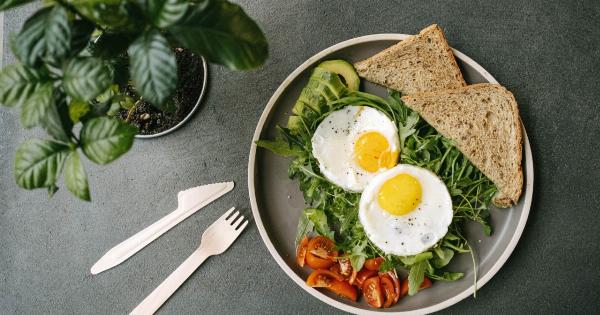Many people believe that eggs are an essential source of protein, especially for those following a vegetarian diet. However, there are plenty of plant-based foods that can provide just as much protein – if not more – than eggs.
Whether you’re a vegetarian or simply looking to incorporate more plant-based protein sources into your diet, here are fifteen vegetarian foods that pack a protein punch:.
1. Quinoa
Quinoa is not only a complete protein but also a fantastic source of essential amino acids. This tiny grain-like seed contains around 8 grams of protein per cooked cup, making it an excellent substitute for eggs.
Quinoa is also high in fiber, magnesium, and various antioxidants, making it a valuable addition to any vegetarian diet.
2. Lentils
Lentils are a protein powerhouse, providing approximately 18 grams of protein per cooked cup. They are also high in fiber and various essential minerals, such as iron, folate, and manganese.
Whether you enjoy them in soups, stews, or salads, lentils are a delicious and versatile way to amp up your protein intake.
3. Chia Seeds
Despite their small size, chia seeds are incredibly nutrient-dense and contain approximately 5 grams of protein per ounce. They are also an excellent source of omega-3 fatty acids, fiber, and various micronutrients.
Add chia seeds to smoothies, oatmeal, or make a chia pudding to benefit from their protein-rich properties.
4. Hemp Seeds
Hemp seeds offer an exceptional complete protein profile, containing all nine essential amino acids. With around 10 grams of protein per ounce, these tiny seeds can easily surpass the protein content of eggs.
They are also rich in healthy fats, including omega-3s and omega-6s, making them a nutritious addition to salads, yogurts, or homemade energy bars.
5. Black Beans
Black beans are not only delicious but also highly nutritious. With approximately 15 grams of protein per cooked cup, they are an excellent source of plant-based protein. In addition to protein, black beans contain fiber, iron, magnesium, and folate.
Incorporate them into hearty soups, tacos, or make a tasty black bean burger to enjoy their protein-rich benefits.
6. Greek Yogurt
Greek yogurt is a fantastic vegetarian source of protein, containing around 20 grams of protein per 7-ounce serving. It is also rich in calcium, probiotics, and various vitamins.
Opt for plain Greek yogurt and add your favorite fruits or nuts for added flavor and nutrients. Greek yogurt can be enjoyed as a snack, in smoothies, or as a base for savory dressings and dips.
7. Tempeh
Tempeh is a fermented soy product that offers an impressive 41 grams of protein per cup, far surpassing the protein content of eggs. It is also high in fiber, calcium, and antioxidants.
Due to its firm texture and nutty flavor, tempeh is a popular meat substitute in vegetarian and vegan dishes. Try marinating and grilling tempeh for a delicious and protein-packed meal option.
8. Edamame
Edamame, or young soybeans, are not only a tasty snack but also an excellent source of plant-based protein. With around 17 grams of protein per cooked cup, edamame provides a satisfying protein boost.
Additionally, edamame is rich in folate, vitamin K, and fiber. Steam the pods and enjoy them as a snack, or add shelled edamame to salads, stir-fries, or soups.
9. Peanut Butter
Peanut butter is a delicious and convenient source of plant-based protein, with approximately 8 grams of protein per 2 tablespoons. It also contains healthy fats, fiber, and various vitamins and minerals.
Spread peanut butter on whole grain bread, add it to smoothies, or use it as a base for sauces and dressings to incorporate extra protein into your meals.
10. Tofu
Tofu, made from soybeans, is a well-known vegetarian protein source. With approximately 20 grams of protein per cup, tofu can easily replace eggs in various recipes. It is also a great source of iron, calcium, manganese, and selenium.
Marinate and bake, sauté, or stir-fry tofu to add it to stir-fries, salads, or noodle dishes.
11. Seitan
Seitan, also known as “wheat meat,” is a popular meat substitute for vegetarians and vegans. It is made from gluten, the protein found in wheat, and contains an impressive 75 grams of protein per cup.
Seitan is also a good source of iron, calcium, and phosphorus. Use seitan in stir-fries, stews, or slice it thinly and grill it for sandwiches and wraps.
12. Green Peas
Green peas may be small, but they are surprisingly packed with protein, providing approximately 8 grams of protein per cooked cup. They are also high in fiber, vitamin C, and various antioxidants.
Enjoy green peas as a side dish, mix them into your favorite pasta dishes, or blend them into a creamy pea soup to benefit from their protein-rich content.
13. Chickpeas
Chickpeas, also known as garbanzo beans, are a versatile legume that offers around 15 grams of protein per cooked cup. They are also rich in fiber, iron, and folate.
Whether you use them to make hummus, toss them in salads, or roast them for a crunchy snack, chickpeas are an excellent vegetarian protein option.
14. Almonds
Almonds are not only a tasty and nutritious snack but also a great source of plant-based protein. With around 6 grams of protein per ounce, these nuts can easily provide more protein than eggs.
Almonds are also rich in healthy fats, fiber, and various vitamins and minerals. Add almonds to your cereal, salads, or enjoy them as a crunchy on-the-go snack.
15. Spirulina
Spirulina is a blue-green algae that packs an incredible protein punch. With approximately 8 grams of protein per 2 tablespoons, spirulina offers a vegetarian protein source that surpasses eggs.
It is also rich in antioxidants, iron, and various nutrients. Add spirulina powder to your smoothies, blend it into energy balls, or mix it into sauces for an extra protein boost.




























